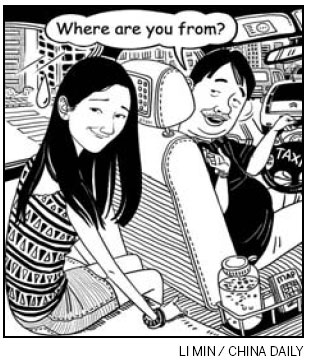I got into a taxi one day after work and recited my address to the driver. The loquacious, middle-aged man with a pronounced double chin turned around and asked: "Where are you from?"
I was hurt. I thought my accent was developing nicely and was practically indistinguishable from a local, but the driver was obviously not fooled.

I could imagine him thinking, "Chinese face and relatively fluent Putonghua, yet the accent's not quite Beijinger".
He scratched his head. He just couldn't quite place it. I don't have the Northeastern syncopation, nor the sweet Taiwanese lisp. Perhaps some obscure ethnic minority he's never heard of?
I relieved him of his curiosity and explained that my parents grew up in China. They both studied in the US and then returned to Hong Kong, where I studied Putonghua at an International School.
"Ah, I see," he nodded his head, "no wonder you don't sound like you're from here at all."
Naturally, I was forlorn. I had come to Beijing to cultivate the local vibe. Clearly, I was failing. I needed to study further.
I was at a bookstall another day when the vendor asked me the same dreaded question: "Where are you from?"
Truly frustrated at this point, I claimed: "I'm a Beijinger. Can't you see?"
The vendor chuckled and shook her head. "Your er's aren't in place. And you're too demure, your words are too careful, too formal. You don't have the Beijing confidence and slang."
Ah, the "er's" and the slang. For the next few weeks, I concentrated on these points. On the subway, on the streets, in restaurants, in public toilets, I kept my ears open, listening to the locals.
I practiced my "er's", artfully inserting them every now and then into my sentences and toiled over the Better Chinese column in China Daily.
There was a lot to learn. For example, I can "mo ya" (grind my teeth, or kill time) at a "ba tai" (bar counter). When berating a hesitant colleague at work, I tell him he has "soft ears", easily swayed by other's opinions.
I've collected a mlange of bargaining vocabulary to whip out at antique stores, instantly decreasing my likelihood of getting swindled.
Perusing the Internet, I found a practical guide to help Chinese speakers determine the accuracy of their accent.

The table read: When they say you sound like a:
Foreigner (laowai): Your Chinese is bad
Waiguoren (foreigner): Your Chinese is bad (but they are being polite)
Southerner: Your Chinese is good, but some consonants are non-standard
Taiwanese: Your Chinese is good, but it sounds like a girl
Beijinger: Your Chinese is amazing
Don't get me wrong, the guide is not a Bible of Chinese accents, but it was accurate. I believe I have moved up the ladder from the foreigner grade I was a year ago, to Southerner now.
Recently, I was in a taxi again when the driver nodded in response to the address I gave him. Once again I imagined what he was thinking. He hesitated. One of the "er's" were probably off again. I sighed and braced myself for the question.
Nothing came. Instead, he kept his ideas to himself, in case of offending a true Beijinger, and drove silently on.
|
|
|
|
|
|
|
|
